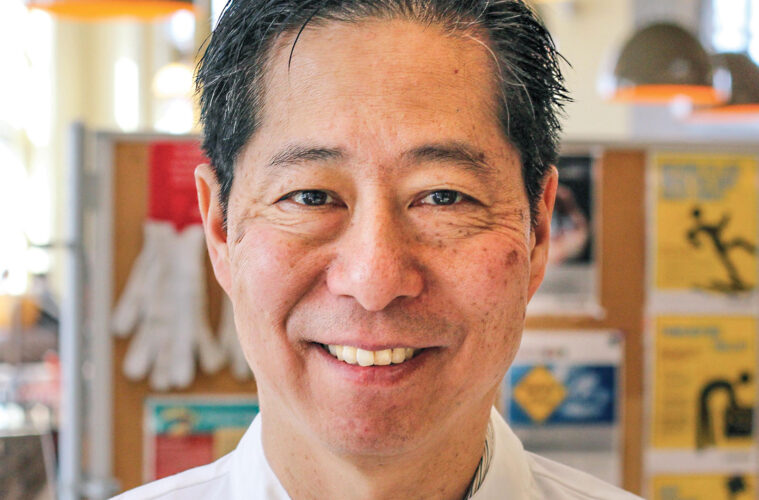Industry publications have featured Tim Buma ’79 for his discoveries and ideas: using egg whites as a pre-coating for spiced nuts to add protein; a veggie burger made of farro, toasted millet, beet greens, and mushroom; collaborating on a Thai food station to introduce clients to dishes beyond the familiar Pad Thai.
For the past 15 years, Buma has been the director of culinary innovation at Restaurant Associates, which predominantly handles corporate dining, restaurants, and cultural centers. Its clients range from the Georgia Aquarium to the Guggenheim in New York City.
Today Buma is based in the Manhattan corporate office, but he began his career in the kitchen as a professional chef. After graduating from Colgate with a geology major, he attended Texas A&M for graduate school and then started working in restaurants and catering. He gained the attention — and a job offer — from Restaurant Associates while he was working as a chef at events like the U.S. Open Tennis. Buma continued to get exciting gigs, including serving as one of the chefs for the 2001 MTV Video Music Awards pre-party and backstage catering at Lincoln Center. Having been with Restaurant Associates for 34 years now, Buma talks about what innovation looks like in the current climate.
Staying on Top of Food Trends
“Trends change drastically from one year to the next. A lot of it is eating at restaurants, seeing what our competitors do, what other food innovators do. It’s also going to seminars and think-tank gatherings where industry leaders exchange ideas and talk about what’s next. With COVID, people got more into self-starting and running their own little businesses out of their houses. There are some great ideas out of that, and just rethinking the way restaurants operate behind closed doors. So it’s about keeping your eyes and ears open, talking to the right people, and traveling. The more you travel, the more you see within the U.S. or globally, and then you bring those ideas back. You read, watch TV and movies, and look at Instagram and see what other people are posting and get inspired. You catch one thing and try to make it your own.”
Early in the Pandemic
“A majority of our clients shut down their businesses. Their employees were working from home, so there was no need for food services in the facilities. But we figured out other opportunities. I worked out of one of our catering kitchens. We provided a boxed meal program for about 1,200 people a day for New York City hospital staff, because they were working 24/7, having a hard time getting proper nutrition, and barely able to take a break. We used the best ingredients we could get and made the best food that would survive the packaging, the transport, and then being left in a refrigerator for several hours before somebody actually got to eat it. We wanted them to have at least a good experience of enjoying great food.
“We also teamed up with other distributors. We worked in conjunction with FreshDirect and provided them with supplies because they were having a hard time with staffing. They weren’t able to keep up with demand. Deliveries to the house became big business.
“During that time, we also were continuously looking to build our portfolio. We had a lot of new business proposals, presentations, and opportunities. That was a different set of challenges, because we were used to going into somebody’s office and doing a formal presentation with food, but everything had to be virtual. We were able to create tastings for our potential clients by putting together a kit that we would send them, and we would go through the whole tasting process that way. It ended up being very successful.”
Overcoming Supply Chain Issues
“If olive oil is going to be low, we’ll use soy oil, or there’ll be another oil that we could use at least for a short period of time. If pork is not available, we just won’t buy as much pork. We’ll throw out a menu that has more chicken. There are alternatives.“
New Demands
“Everything started coming back to normal at a breakneck speed, so our next challenge is, how do we reopen and reengage everybody when resources are a little bit limited? Human resources are more limited; availability of staff is at a premium.”

